
Are you curious about your 10-year-old’s intelligence?
Knowing where your child falls in the IQ range helps you get great insight into their development. You can also get inspiration for ways of helping them thrive in what they’re skilled in.
So, today we’re going to tell you about the facts on a 10-year-old’s IQ, their average score, and what it means if they have a specific range.
Facts About Your 10-year-old’s IQ
IQ score indicates the cognitive abilities of a child. It shows how they do when it comes to problem-solving, logical thinking, and communication.
However, IQ is not the only factor that indicates your child’s potential in life, and since they’re still developing, there’s the possibility to enhance their IQ.
Your child’s IQ, or Intelligence Quotient, measures their cognitive abilities.
Average IQ for a 10-Year-Old
Most 10-year-olds get an IQ score between 90 and 110.
If your child got anything in this range it means they have a normal IQ and they’re developing just normally.
Can a 10-year-old Take an IQ Test?
You may be asking where and how to get your child tested. First of all, you should know that there are IQ tests designed especially for children, and you should use those tests.
They can choose to take the test alone or in a group setting. You and their teachers can work together to give the test.
Remember, stress puts extra pressure on children and negatively affects their test scores. So, make sure you’re pretty cool about the test. Your child should think it’s just a game, and the outcome is no big a deal!
How to Use IQ Test Scores?
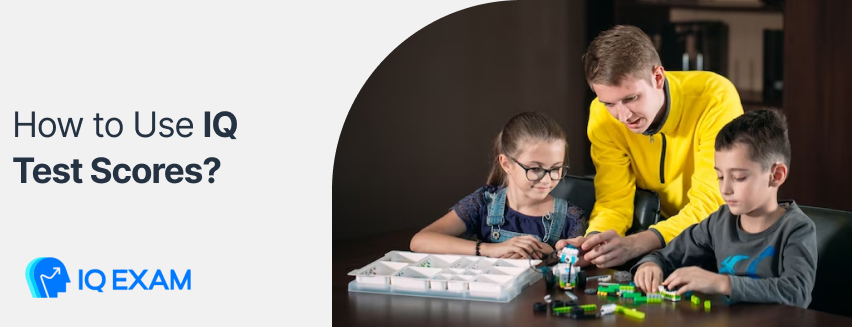
Teachers and mentors could use your child’s test scores to tailor the right learning methods and programs for them.
Also, you can use the scores to understand where your child might need additional support and assistance. You can guide them to the proper professional or academic future if you also know more about their cognitive abilities.
IQ 120 For 10-year-olds
If your child has got a score of 120 on their IQ test, they’re considered above average.
This means they understand more complicated concepts better than people their age. They also have reasoning skills beyond their age!
IQ 130 and Higher For 1-0-year-olds
If your child has IQ of 130 and higher, well, congrats! You’ve got a genius at home!
This means your child is a prodigy and they excel in learning.
Low IQ for a 10-Year-Old
A low IQ for a 10-year-old means any score below 70. You may expect delays in their development and challenges in their cognitive functioning.
IQ of 80 for a 10-Year-Old
If your child has an IQ of 80, it means they’re in the lower average range.
It’s not very high but it means they’ve still got strengths and have potential in many fields.
Improving a 10-Year-Old’s IQ
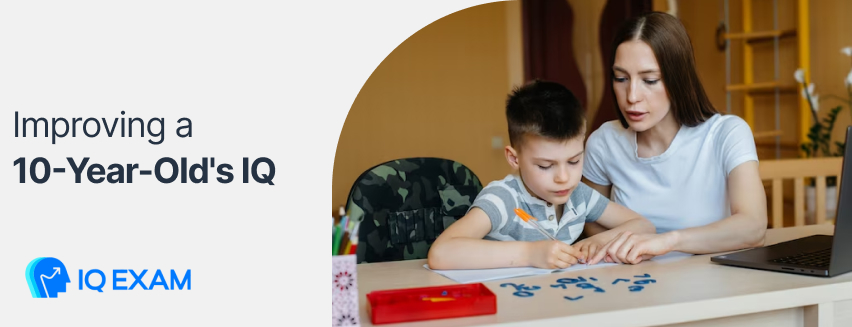
Improving a child’s IQ is possible since they’re still developing.
These are some techniques you can use:
Curiosity is Fine!
Let your child be curious; if they’re not, appreciate subjects and activities that raise curiosity.
If they ask, encourage them by answering to all their questions and letting them think. It may be a little too much sometimes, but it’s necessary to your child’s mental growth.
Reading as a Team!
Read with your child. This way you don’t just create a good habit for them, but you also expand their vocabulary and teach them creative thinking.
Reading is an easy and effective way to improve your child’s cognitive skills.
Puzzles and Games
Puzzles are the best way to both entertain your child and boost their problem-solving skills. Why not try it today?
A Healthy Lifestyle
Nutrition also plays a significant role in enhancing your child’s IQ. So, start with a balanced diet. Lifestyle changes such as getting enough sleep and regular exercise also help develop their brain.
Teach with Hands-on
Hands-on experiences teach children things they never forget. It fosters deeper understanding and creativity as well.
Limit That Screen Time!
Limit gaming, TV, and laptop time because excessive screen time will stand in the way of your child’s full cognitive development.
Encourage Hobbies
Support your child in pursuing hobbies stimulating their interests and skills, nurturing a well-rounded intelligence.
Signs Your Child Has a High IQ
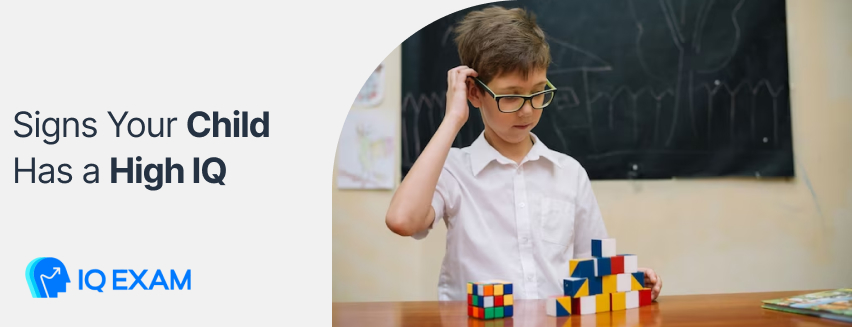
Gifted children are the ones with IQ 130 and higher. They have advanced problem-solving skills, and their quick learning surprises everyone!
Let’s see how we can find out our child is gifted.
Curiosity and Exploring
Gifted children are mostly curious. They ask many questions, even weird ones!
They mostly get to notice things beyond what is expected of their age.
Fast Learning and Adaptability
Children with IQs over 130 tend to learn everything very fast. Whether it’s school mathematics or music, your child will move much faster than other 1–year-olds.
Advanced Problem-Solving Skills
If your child is a genius, they’re more likely to solve complex problems and puzzles, which means they’re natural problem-solvers.
They think out of the box, which leads to a great professional and academic path.
Attention to Detail
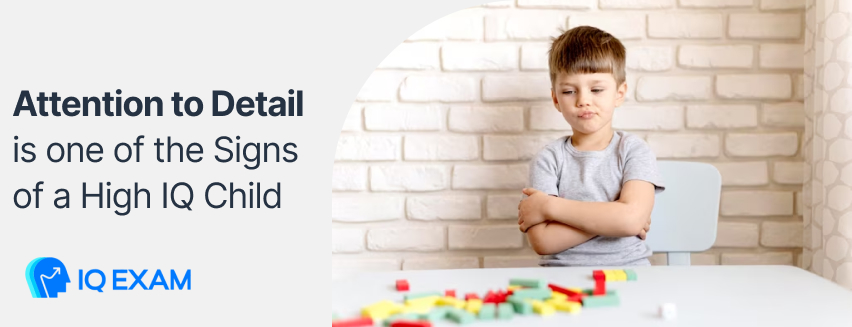
Your child notices things no one else does if they’re a genius.
Your child may notice subtleties that others might overlook, demonstrating a strong eye for precision.
Creative and Original Thinker
Gifted children often think outside the box, approaching problems and tasks in unique ways
They may come up with creative solutions and enjoy exploring unconventional ideas. If your child has a good imagination and writes stories and poems, you may be parenting a gifted child.
Excellent Memory
Does your child remember everything?
High-IQ individuals often possess impressive memory and retention abilities. Your child might remember details from various topics and recall information accurately.
Being a Parent to a Gifted 10-Year-Old
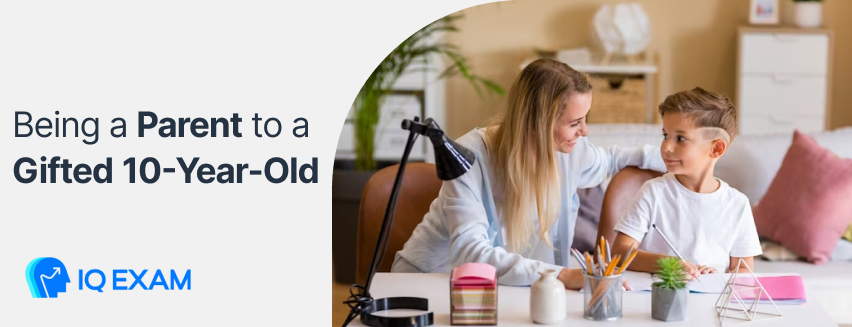
Parenting a gifted child comes with its own set of joys and challenges.
Nurturing their abilities while providing a supportive environment is necessary.
Here’s how you can navigate this journey:
Listen Actively
Give your child a platform to express their thoughts and ideas. Engage in meaningful conversations and show genuine interest in their interests and concerns.
Encourage Exploration
Support their curiosity by asking open-ended questions.
Allow them to explore topics deeply and encourage them to share their findings.
Don’t stop your child if they’re overly curious; just ensure their safety.
Provide Challenges
Offer thought-provoking challenges and encourage discussions that stimulate their intellect. Acknowledge their accomplishments and provide constructive feedback.
Set Clear Boundaries
Establish clear rules and expectations while nurturing their talents. Gifted children, like all children, need consistent discipline to understand limits.
Explain Consequences
When discipline is necessary, explain the reasons behind it. Gifted children often appreciate logical explanations and can learn from the experience.
On the other hand, if you discipline them without explanation
Encourage Responsibility
Help them understand the importance of responsible behavior. Assign age-appropriate tasks and involve them in decision-making processes.
Provide Stimulating Materials
Offer books, games, and activities that challenge their intellect and creativity. See what interests them, and get them games and books with the same theme.
Follow their Passion
You need to support your children if there’s anything they show passion in. Don’t think they should be solely astronauts or presidents if they’re geniuses! They can also thrive in art, literature, philosophy, and academia.
Celebrate Their Efforts
Praise them with a little gift if you see any sign of effort. Let them know that you take their resilience for granted.
Don’t Be An All Work And No Play
Having a real childhood is necessary for your child’s long-term. mental health. So, just don’t push them to study and work hard.
Let them spend time playing or hanging out with their friends to develop social skills and EQ!
My 10-Year-Old Has a Low Mental Age
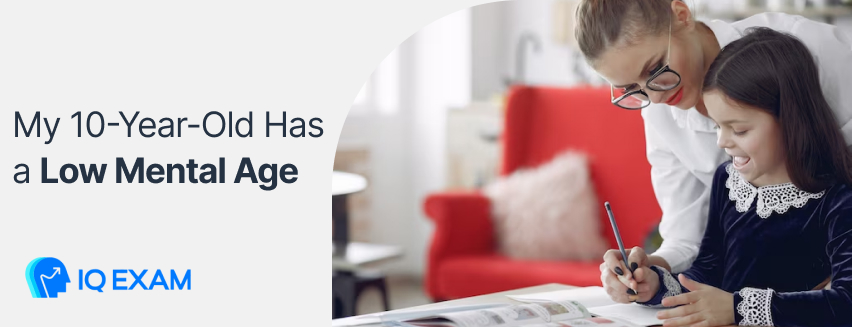
We totally understand your concern about your child’s score. But you don’t need to worry now; you should start planning to be more supportive and understanding since your kid needs you more than others.
Here’s how!
Parents and Slow Learners
Tailored Learning Programme
First, recognize your child’s strengths and the speed of their pace. Then, when defining tasks for them or teaching them new stuff, break down every concept into small portions.
This technique helps them learn deeper and memorize easier.
Be Patient
Not only you but the environment around your child should be patient. You should only point out the progress and never blame them for not being fast enough.
Set Realistic Goals
If you set big goals your child is most likely to fail in it, leaving them with a bad feeling about themselves.
Instead, set manageable and achievable goals so that it boosts your child’s self-steem when reached.
Communicate with Teachers
Maintain open communication with teachers. Collaborate to develop strategies supporting your child’s learning needs in school and home environments.
Frequently Asked Questions
What is the normal range of IQ for a 10-year-old?
A normal IQ for a child is between 90 to 110. Most children get a score of 100.
What is the best IQ test for children?
The best tests designed for children are WISC (Wechsler Intelligence Scale) or Stanford-Binet Intelligence Scales. Ask your child’s teachers and educators about what is the best choice for your child.
eas for growth.
What Signs Show That My 10-Year-Old Is Gifted?
If your child learns everything faster than other kids, solves complex problems and puzzles, and thinks very creatively, you may have a gifted child!
How Can I Help A Slow Child?
Being supportive is the key to helping a slow child adjust to society. It takes experience, patience, keeping positive, and lots of communication. Tailored teaching methods may be necessary as well.
Where Do I Get My Child Tested for IQ?
Educational or clinical psychologists are the best people to test your child’s IQ. Their school might give such tests or know centers that do. You may ask their teachers for more detail.
What Are the Challenges that Low IQ Children Face?
These children struggle to learn complex concepts. They learn slowly and aren’t comfortable with academic tasks. They might require more time and support to succeed.
What Are the Challenges that High IQ Children Face?
High-IQ children can be bored in standard classrooms. They tend to have heightened expectations and socially isolate themselves because they think they’re different.
Also, being idealists makes facing failure harder for them.
Conclusion
And there you have it!
the exciting world of IQ scores and your incredible 10-year-old!
So, together we learned that whether your 10–year-old’s IQ is dancing high or taking a chill pill on the lower side, what truly matters is the endless joy, laughter, and love you share with your child.
Nurture their curiosity, applaud their accomplishments, and let their imagination do the rest.
This is just the beginning of your 10-year-old’s awesome journey, and you’re their ultimate cheerleader!
Value:
The competitors lack some headlines as “being a parent to a gifted child” (and all its sub-sections), and how to work with slower children. The parts about “how to improve a child’s IQ” are also added.
